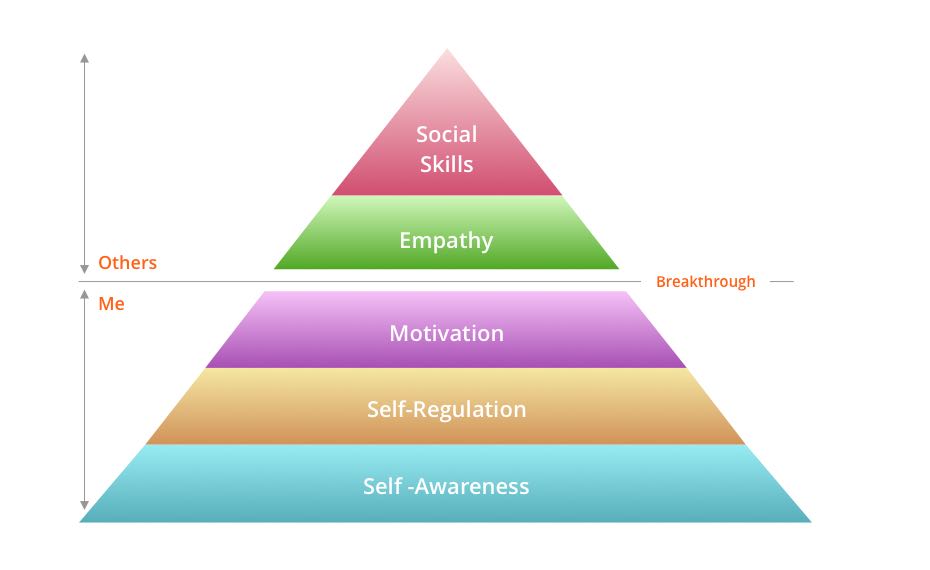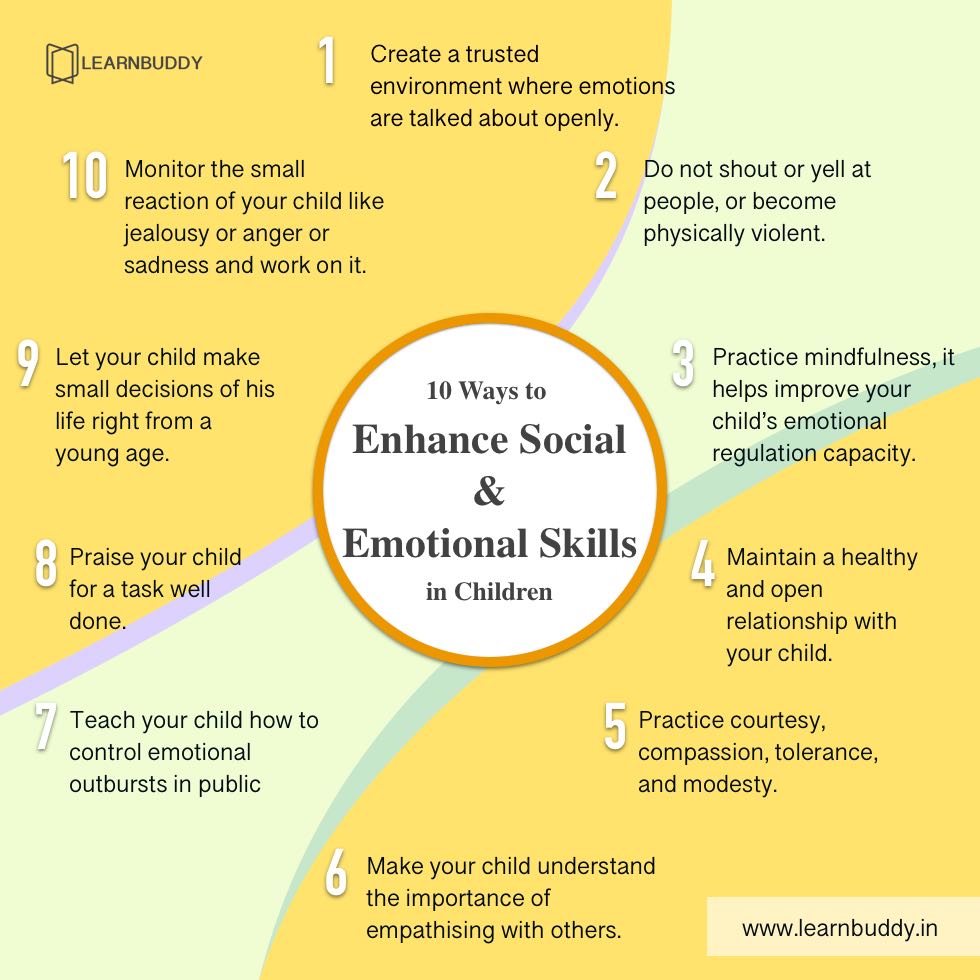Social-emotional development is a very important part of the growing up years of children. It forms an integral part of their overall development. Studies suggest that social-emotional development takes place gradually starting from the early childhood days. Therefore, parents have a crucial role in the development of social-emotional skills in children.
Before we look at ways in which parents can play a part in their child’s social-emotional development, let’s understand what is social-emotional development and how does it help our children.
What is Social-Emotional Development?
To understand social-emotional development for children, it is important to understand the relation between emotional intelligence and social skills and behaviour.
Understanding Emotional Intelligence
When emotions run high, people do and say things they normally would not. Children may do likewise. It is noteworthy that children have the ability to feel, understand and express emotions from a young age. It probably starts when they are just a few months old, they can show their happiness by smiling at their parents. Children attain emotional maturity as they grow old.
Consider a scenario when your child is unable to understand a concept and is unable to finish his or her homework. Hence, he or she is struggling. Your child can react to it in two ways – either yell, feel frustrated and give up or come up to you to explain the situation and ask for help. These reactions are signs of an important skill that is known as “Emotional Intelligence” (EI). Emotional intelligence is the ability to identify, use, understand and manage emotions in an effective and positive manner.
Essentials of Emotional Intelligence
There are 5 key essentials that form emotional intelligence:

- Self-awareness – Self-awareness is when you recognize your emotions as they happen. Developing self-awareness requires tuning in to your true feelings. If you evaluate your emotions, you can manage them.
- Self-regulation – We seldom have control over the emotions we are experiencing. However, we can control how long the emotion will last. Some ways to alleviate negative emotions such as anger, anxiety or depression can be taking a long walk or meditation or prayer.
- Motivation – Motivating yourself for any achievement requires clear goals and a positive attitude.
- Empathy – Understanding and sharing the feelings and emotions of people around you is empathy. Empathizing with others is a crucial factor to build a positive and strong relationship.
- Social skills – The ability to communicate with others in a clear and concise manner define your social skills. A person with good social skills empathizes with others, communicates better and is aware of his or her emotions too.
Here is a short video about emotional intelligence by Dr Travis Bradberry, award-winning co-author of the #1 best selling book, Emotional Intelligence 2.0.
Emotional Quotient (EQ)
It is a well established fact that Intelligence Quotient (IQ) alone is not enough for a successful individual. Scientific research suggests that emotional intelligence is twice as strong as a factor to determine a child’s success in later years as IQ. Among the ingredients of success, IQ has roughly 10% (at best 25%); the rest depends on everything else — including Emotional Quotient (EQ). Emotional Quotient is how our emotional intelligence is measured. Testing and improving your EQ is the need of the hour now.
A person with high EQ can communicate better, resolve disputes and conflicts, manage stress better and is likely to feel less anxious. It is also seen that people with high EQ tend to have better relationships and empathize better with people compared to the ones with lower EQ. Our emotional intelligence influences our behaviour and hence, our relationships.
There is a lot of focus on a child’s academic achievement while emotional self-regulation is largely ignored. Being a parent puts you in a position to steer your child towards a positive attitude and healthy relationships with people around them. Parents have a big role in shaping up their children to become emotionally strong. This will help them to develop good self-esteem and also manage stress and have good mental health later in their life.
Social Skills and Behaviour
Social skills development of children happens when they learn to interact with others around them. It includes how a child is able to express and manage own emotions and establish a meaningful and respectful relationship with others. Social development also determines how a child deals with conflicts that might arise with peers. For children to develop foundational skills such as cooperation, following directions, demonstrating self-control and paying attention, they must have social skills. Studies show that social skills directly relate to developing leadership qualities in children.
To summarize, social-emotional development enables children to have the ability to recognize and understand their experiences and feelings. They are able to not only express their emotions, but also manage them effectively. They are also able to establish and maintain positive and fulfilling relationships with others. As a result, social-emotional development sets a robust foundation for children to grow up to be a responsible social and emotionally-balanced adults.
Why is Social-Emotional Development Important for Children?
Social-emotional development is an essential part of your child’s overall development process. As children grow, many situations arise that lead to emotional outbursts. Social-emotional development in early childhood helps them face challenges in life and build long-lasting relationships. It has been observed that children with high EQ earn better grades, stay in school longer and make healthier choices overall. Students with high EQ are more co-operative and make better leaders in the classroom. The study has also found a relationship between emotional intelligence and bullying. With EQ development, children can learn to deal with it and also empathize with others to not indulge in such acts.
Social-emotional development not only helps children deal with peers in school but also prepares them for the future, be it their higher education college, university or professional life. It helps in stress management and having a positive approach towards life. Even at workplace, employers look for a motivated individual who can complete work and get along well with coworkers.
Social-emotional development in children can help them:
- Improve self-awareness: Being aware of their emotions and how to manage them.
- Manage stress: Recognize what is causing stress and how to solve it.
- Boost self-motivation: Set up goals for themselves and push themselves to meet them.
- Build empathy: Understand the emotions of others.
- Make good decisions: Choose the best path for themselves.
- Communicate effectively: Use verbal and non-verbal cues to communicate well with others.
- Develop positive relationships: Have a healthy and positive relationship with the people around them.
Ways to Enhance Social and Emotional Skills in Children
Having realised the importance of social-emotional development, more and more schools are introducing Social Emotional Learning or SEL programs. Trained teachers are instrumental for the success of the SEL programs. However, home is where the learning and skill development for children begins. Along with the physical growth and development of their children, parents can observe and monitor the social-emotional development and focus on continuously developing it.
Here are some ways in which parents can help enhance their child’s social and emotional skills:

- Create a trusted environment where emotions are talked about openly. Children must be taught to recognize and communicate their feelings. Do not shy away from talking about your feelings too. This will encourage your child to open up.
- Do not shout or yell at people or become physically violent. This can have a significant adverse impact on your child’s mind. At the same time, do not raise hands on your child too. Needless to say, children learn more from observing you.
- Practice mindfulness, it helps improve your child’s emotional regulation capacity. Mindfulness practice can help in stress management and reduce anxiety and depression.
- Maintain a healthy and open relationship with your child. Be approachable for your child and act as a guide. This gives your child the confidence to approach you whenever he or she requires. Use every possible opportunity to talk to your child about emotions and teach them how to manage their emotions.
- Qualities such as courtesy, compassion, tolerance and modesty are essential to bond well with others. Inculcate them in your child so that they help your child in their relationships with people around them.
- Make your child understand the importance of empathising with others. This will help your child to avoid stereotyping people or being prejudiced towards someone.
- Teach your child how to prevent emotional outbursts in public and how to deal with them. Teach them about the various techniques like deep breathing, counting till 10.
- Praise your child for a task well done and ensure that you provide constructive feedback every time. Teach your child to pat his or her own back on accomplishments rather than seek appreciation from others. This will make them persevere and strive towards long-term goals, rather than seek immediate results.
- Let your child make small decisions of life right from a young age. Let your child choose clothes, food, games, etc for himself or herself.
- Monitor the early instances of reactions such as jealousy, anger or sadness and work on them.
To sum up, social-emotional development of a child is a long-term process and it must start from the very beginning of early childhood. With the right guidance and care, children can become emotionally resilient and can better manage their lives and relationships.

